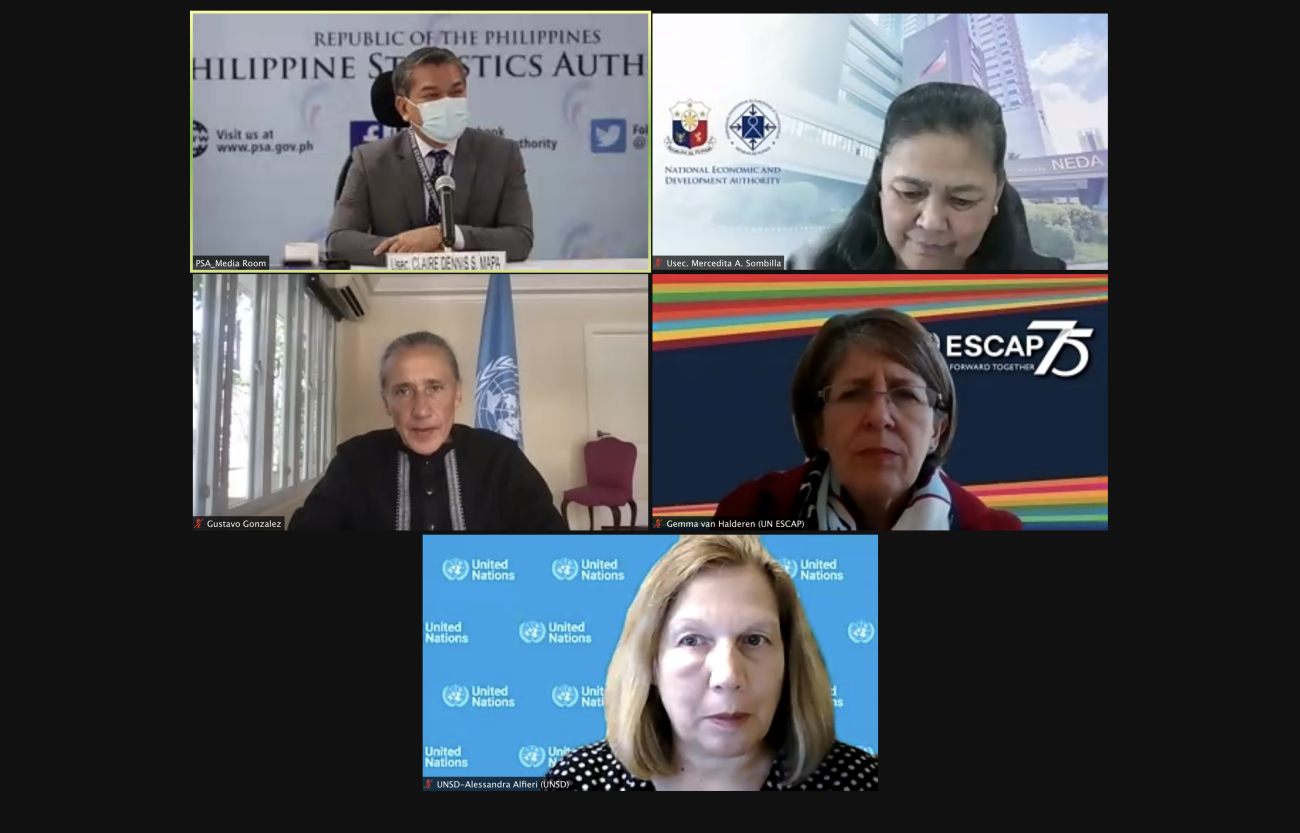UN Philippines chief underscores importance of environmental-economic accounting to measure SDG progress

Mr. Gustavo Gonzalez says that economic growth and climate action can be harmonized but we need data to show this
United Nations (UN) Resident Coordinator in the Philippines Gustavo Gonzalez gave a keynote message at the High-Level Launch for the Philippines of the project, "Environmental-Economic Accounting for Evidence-Based Policy in Africa And Asia" on 28 May 2021.
The project aims to aims to strengthen the institutional and technical capacity of the Philippines Statistical Authority (PSA) and to develop System for Environmental-Economic Accounting (SEEA) implementation strategies. The SEEA provides countries with a framework to derive integrated statistics and indicators which are internationally comparable. This is particularly important for the 2030 Agenda, the post-2020 Global Biodiversity Framework and Paris Agreement. In addition, in general the SEEA allows for an integrated approach to policy—one which helps understand the synergies between the different pillars of sustainability. Environmental-economic accounts provide information on drivers and impacts behind the use of natural resources. The unsustainable use of natural resources and its resulting effects (climate change, loss of biodiversity, etc.) disproportionately affect women and the poor, who often depend on natural resources for their livelihoods. The SEEA can provide a robust, statistically-based policy that addresses the economic drivers and impacts of unsustainable use of natural resources.
Mr. Gonzalez's message (as delivered) follows:
I am pleased to be part of the launch of the project “Environmental-Economic Accounting for Evidence-Based Policy in Africa and Asia”, and I celebrate that the Philippines was selected as one of the project countries.
We frequently say that the Sustainable Development Goals (SDGs) represent the first ever democratically forged agreement on universal development. We also say that that the Goals were agreed by all UN Member States, but the process of selecting and defining the performance indicators was delegated to the global statistical community.
In practical terms, this means that statisticians are defining the meaning of the 2030 Agenda targets and will thus be the ones to determine whether the Agenda is ultimately pronounced a success, a failure or something in-between.
The present project is part of these efforts to ensure success of the 2030 Agenda and we commend the investment made by the Statistics Division of UNESCAP in the region.
The government’s Philippine Development Plan for 2017-2022 has already fully integrated and aligned the SDGs with the PDP goals and objectives.
At the same time, the PDP has broadened its measure of the country’s wealth beyond Gross Domestic Product (GDP) and now takes stock of the country’s natural capital, consistently with the framework and methodology of the system of national accounts.
As we know, most building back better plans are heavily focused on economic recovery – such as providing jobs and restoring livelihoods – which is resonable. However, recovery should also be green, and climate resilient. In this sense, Integrated environmental-economic accounts will provide useful indications whether the recovery efforts are achieving the desired economic impact, but also show if these are at the expense of, or compromising, the environment. At the same time, having such accounts will help us to determine whether the push towards low carbon transformation and energy transition is being done in a manner that does not set back economic gains.
As you may know, the UN in the Philippines recently updated its cooperation framework. We call it “The Socioeconomic and Peacebuilding Framework for the COVID-19 Recovery”. The environmental-economic accounting approach is central to one of the objectives of this framework, which is to ensure that economic growth and climate action are harmonized to put communities on a path of resilient, equitable and sustainable development.
We will endeavor to support the Philippines to speed up the reduction of income poverty in the medium term, while putting the country on a path to shared and sustained prosperity for all in the longer term. And to this end, one of our priority programming will support the integration of a green and climate lens in recovery efforts, including accelerating low carbon transformation.
Data to be generated by the System of Environmental – Economic Accounting (SEEA) will also help us measure and monitor the impact and results of these programmes. Thus, we embrace the adoption by the Philippines of the SEEA and future collaboration with the Philippines Statistical Authority and the NEDA to track the achievement of our shared objectives.
We all recognize that economic growth and environmental protection can and should go hand in hand. But we need data to show that these two important aspirations are not opposed.
This project could provide the tool that we need to present compelling evidence of the argument. [Ends]















